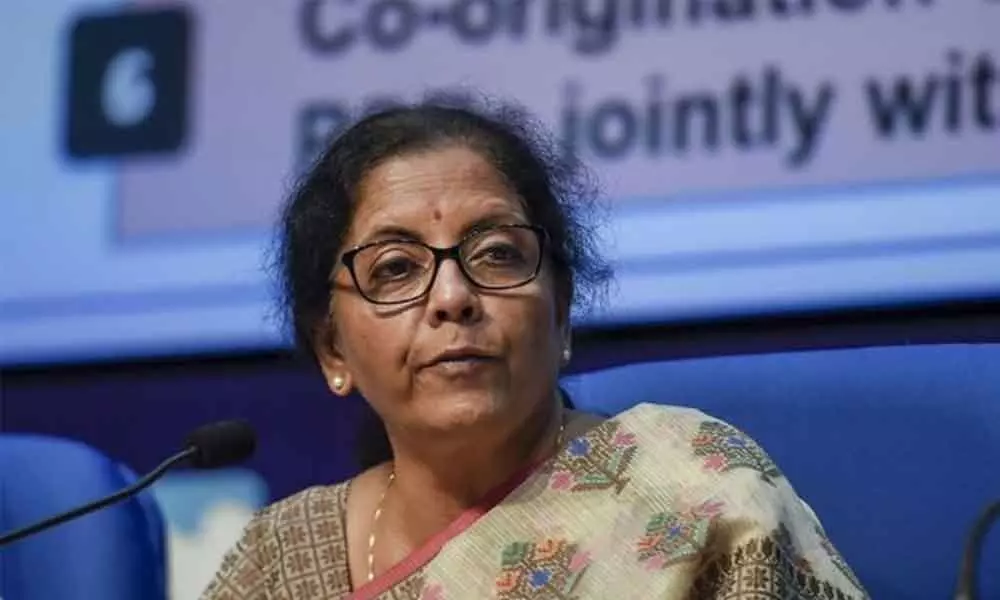Will Centre bring ATF into GST net?
The Centre will bring for discussion in the next meeting of the GST Council the issue of bringing aviation turbine fuel (ATF) into the goods and services tax (GST) regime, Union Finance Minister Nirmala Sitharaman said on Sunday, as she noted that rising global fuel prices is a ‘concern.’
image for illustrative purpose

New Delhi: The Centre will bring for discussion in the next meeting of the GST Council the issue of bringing aviation turbine fuel (ATF) into the goods and services tax (GST) regime, Union Finance Minister Nirmala Sitharaman said on Sunday, as she noted that rising global fuel prices is a 'concern.'
When the GST was introduced on July 1, 2017, amalgamating over a dozen central and State levies, five commodities – crude oil, natural gas, petrol, diesel and ATF – were kept out of its purview given the revenue dependence of the central and state governments on this sector. Sitharaman, in a post-Budget discussion with industry chamber Assocham, said a final decision of inclusion of ATF in GST will be taken by the Council, which comprise finance ministers from Central and state governments. "It is not with ... (the Centre) alone, it has got to go to the GST Council. The next time we meet in the Council, I will put it on the table for them to discuss it," she said.
The minister was responding to views expressed by SpiceJet Founder Ajay Singh where he sought the support of the Union finance minister in bringing ATF into the GST regime.
"Oil is at $90, the rupee is at 75 to a dollar and, therefore, the civil aviation sector has become chronically ill. Your kind support (in bringing ATF into GST) in this process will be extremely helpful," Singh said. Currently, the central government levies excise duty on ATF, while state governments charge VAT. These taxes, with excise duty, in particular, have been raised periodically with rising oil prices. Including oil products in GST will not just help companies set off tax that they paid on input, but will also bring about uniformity in taxation on the fuels in the country.
"Of course just not for the airline, but the global price of fuel is now a concern for all of us, more so for airlines which have not seen a complete head-up post the pandemic," Sitharaman said. She said she will speak with the banks to see what best we can be done for the airline sector. "You also spoke about the industry status to be given so that can help to attain better banking assistance. I will have a word with banks on that," she said. Singh in his remark had said banks instead of being supportive to stressed sectors are withdrawing facilities from these sectors. "So, I request that there should be a message of support from the government. "If for a period of 2/3 years these sectors could be put under priority lending or infra category that would help because today the banks are not there when we need them, they are in sectors which are doing well and that's creating a great deal of stress," Singh added. In her response, Sitharaman said "there are serious problems... I understand. Just as we were thinking that the airline industry is going to revive we had Omicron come in and more than anything else states being very, very cautious have brought in again severe restrictions in movement of people and...internationally too the quarantine requirements are really hurting the airline industry just at a time when you are likely seeing a revival".
Govt prepared to deal with any global development
India is prepared to deal with any situation arising out of global developments, including the US Federal Reserve's decision to roll back monetary easing, and will not allow the economy to suffer, asserted FM.
In a post-Budget interaction with industry body Ficci, she urged corporates to take advantage of the recovery in the economy and step up investment. "It's time now for us as Team India to rise. We are at such a juncture where revival of the economy is very clear...this recovery is therefore going to place India as the fastest growing economy among the larger economies and that would continue even in the next fiscal," the minister said.
Post pandemic, the world order has changed and industry leadership should ensure that India doesn't miss the bus this time, she said. Recalling that India missed an opportunity post the global financial crisis, she said the taper tantrum was not absolutely well addressed and as a result, India missed out on one big opportunity that was available at the time. "Now with the RBI and the government working together and very much keenly observing what is going on in the global financial ecosystem...we have also learnt the lessons of the last crisis which the government of India faced in 2012-13 and 2013-14.
"We are fairly watchful of what is happening as regards the global strategic developments, as regards the Fed decision, and as also regards the global inflationary pressures, we are keeping a very close watch, and I can assure the leadership here that we shall not allow the Indian economy to suffer for want of preparations," she said. She exuded confidence that India would definitely leap forward and reach such sustained growth levels and before 2047 it would stand out as one of those well developed, absolutely endowed countries. The US Federal Reserve has decided to end its bond purchasing programme in March and increase interest rates thereafter to control high inflation. Emerging economies like India have been beneficiaries of increased liquidity and have attracted huge foreign fund inflows. However, they will face the threat of huge fund outflows as the US Fed will taper off buying of assets.

